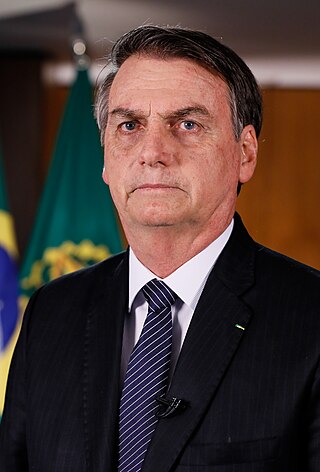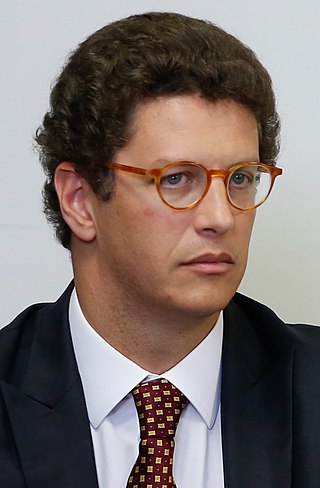
The Brazilian Space Agency is the civilian authority in Brazil responsible for the country's space program. It operates a spaceport at Alcântara, and a rocket launch site at Barreira do Inferno. It is the largest and most prominent space agency in Latin America.

The Republicans, formerly the Brazilian Republican Party and originally formed as the Municipalist Renewal Party, is a Brazilian political party. Its electoral number, the numerical assignment for Brazilian political parties, is 10.

The Funnies, also known as Bubbly the Astronaut, is a Brazilian comic strip series, created in 1963 and part of the Monica's Gang comic strips. It centers around Bubbly, an astronaut, whose parents and ex-girlfriend Rita appear very rarely, making him the only recurring character. The comic strip can be defined as a science fiction adventure strip.

An astronaut-politician is a person who has entered politics after traveling to space as an astronaut. Even with the increasing number of individuals who have flown in space, astronauts still maintain a wide degree of public recognition, and those interested in pursuing a career in politics have been able to take advantage of their renown to enter politics at higher levels of elected office.

Fernando Haddad is a Brazilian scholar, lawyer and politician who has served as the Brazilian Minister of Finance since 1 January 2023. He was previously the mayor of São Paulo from 2013 to 2017 and the Brazilian minister of education from 2005 to 2012.

The National Institute for Space Research is a research unit of the Brazilian Ministry of Science, Technology and Innovations, the main goals of which are fostering scientific research and technological applications and qualifying personnel in the fields of space and atmospheric sciences, space engineering, and space technology. While INPE is the civilian research center for aerospace activities, the Brazilian Air Force's General Command for Aerospace Technology is the military arm. INPE is located in the city of São José dos Campos, São Paulo.

General elections were held in Brazil on 7 October 2018 to elect the president, National Congress and state governors. As no candidate in the presidential election received more than 50% of the vote in the first round, a runoff round was held of those offices on 28 October. On that day, right-wing outsider candidate Jair Bolsonaro defeated leftist Fernando Haddad and was elected President of Brazil.

Ricardo Magnus Osório Galvão is a prominent Brazilian physicist and engineer, formerly the Director-General of the National Institute for Space Research. He is a full Professor of the Institute of Physics of the University of São Paulo, member of the Brazilian Academy of Sciences, fellow of the Institute of Physics and councilman of the European Physical Society. Galvão has occupied major positions within the Brazilian Physics community such as the presidency of the Brazilian Physical Society (2013–2016) and the directorship of the Brazilian Center for Research in Physics (2004–2011).

Joice Cristina Hasselmann is a Brazilian politician, journalist, writer, activist, and political commentator.

The 2018 presidential campaign of Jair Bolsonaro was announced on 3 March 2016. Brazilian federal deputy and former military officer Jair Bolsonaro became the official nominee of the Social Liberal Party during their convention on 22 July 2018. The running mate decision came later on 8 August, when General Hamilton Mourão was chosen to compose the ticket with Bolsonaro. By choosing Mourão as running mate Bolsonaro secured a coalition with the Brazilian Labour Renewal Party.

Jair Bolsonaro's tenure as the 38th president of Brazil began with his inauguration on 1 January 2019, and ended on 1 January 2023. Bolsonaro took office following his victory in the 2018 general election, defeating Fernando Haddad. His presidency ended after one term in office, following his defeat in the 2022 general election to Luiz Inácio Lula da Silva. In the years Brazil has been a democracy since 1985, Bolsonaro became the first president to lose an election as an incumbent.

Augusto Heleno Ribeiro Pereira is a Brazilian politician retired general of the Brazilian Army. He was military commander of the Amazon and Chief of the Department of Science and Technology of the Army. Heleno has declared positions against official politics, particularly about the attitude of the international community in regards to Haiti and the indigenous politics of the Brazilian government.

Ricardo de Aquino Salles is a Brazilian politician who has served as Minister of the Environment from 1 January 2019 to 23 June 2021, under President Jair Bolsonaro.

Abraham Bragança de Vasconcellos Weintraub is a Brazilian economist and investment banker who served as Brazil's Minister of Education from 2019 to 2020. He served as the Executive Director for the World Bank from the 15th district from 2020 to 2022, when he resigned his post in order to run in the 2022 São Paulo gubernatorial election.

The Missão Centenário was born of an agreement between the Brazilian Space Agency (AEB) and the Roscosmos on October 18, 2005. The main objective of this treaty would be to send the first Brazilian into space, Lt. Col. Aviator Marcos Pontes.

The 2022 São Paulo state election took place in the state of São Paulo, Brazil on 2 October 2022 and 30 October 2022. Voters elected a Governor, Vice Governor, one Senator, 70 representatives for the Chamber of Deputies, and 94 Legislative Assembly members. The incumbent Governor, Rodrigo Garcia, of the Brazilian Social Democracy Party (PSDB), was eligible for a second term and ran for reelection.
General elections will be held in Brazil on 4 October 2026 to elect the president, vice president, members of the National Congress, the governors, vice governors, and legislative assemblies of all federative units, and the district council of Fernando de Noronha. If no candidate for president or governor receives a majority of the valid votes in the first round, a runoff election is held on 25 October.

Marco Edson Gonçalves Dias, also known as G. Dias, is a retired divisional general of the Brazilian Army. He was the head of the Institutional Security Bureau.

Galileo Solar Space Telescope – Multi-mission Platform (GSST-PMM) is a mission proposed by Brazil's National Institute for Space Research (INPE) that aims to precisely measure the solar radiation at the top of the Earth's atmosphere, the magnetic field in the photosphere and the upper solar atmosphere.





























